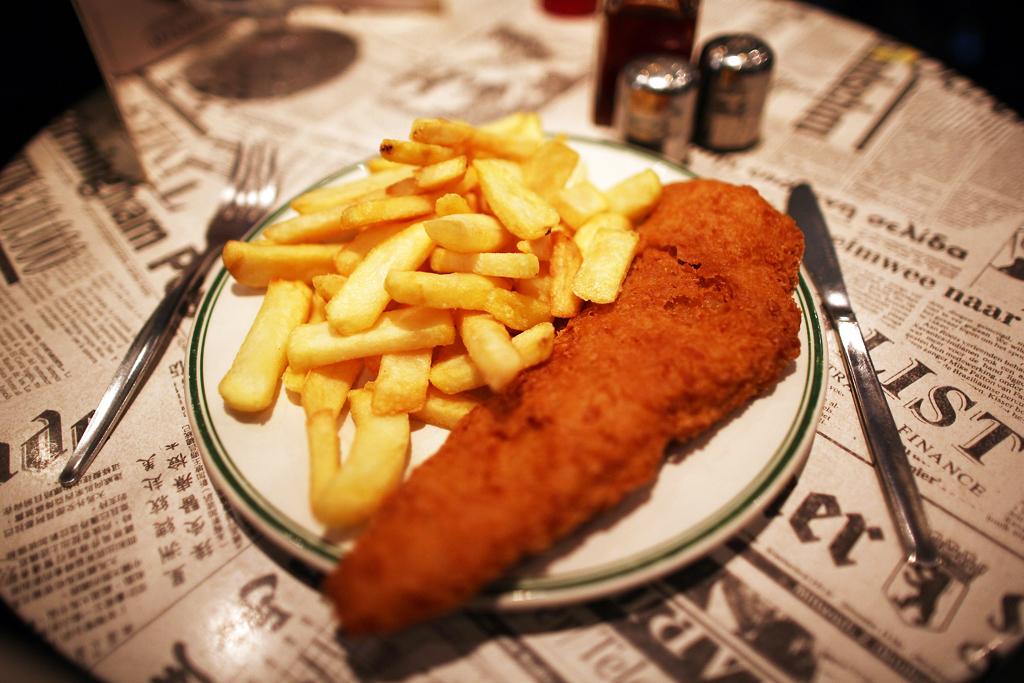UK study: 7.4 percent of fish sold as cod is mislabeled
A traditional dish of Fish and Chips is placed on a table in a cafe on February 22, 2011 in London, England.
LONDON, UK — Fish and chips may never taste quite the same.
A new study shows that 7.4 percent of fish sold as cod in the United Kingdom and 28.4 percent of fish sold as cod in Ireland is actually not cod, but cheaper species of fish.
Cod is often used in Britain’s iconic fried fish served with French fries, or chips as the British call them.
“We found that substitute species could be pollock, haddock, whiting and the cobbler," Dr. Stefano Mariani, a biologist at the University of Salford who did the study, told MSN UK. “We found some products labeled as Pacific cod but they were found to be unarguably Atlantic cod.”
As of yet, news of mislabeled fish hasn’t sparked in Britain the visceral reaction that the horsemeat scandal did.
The species surreptitiously substituted for the cod and haddock normally used in Britain's beloved deep-fried fish aren’t believed to pose any health risks.
They are, however, cheaper, leading scientists to believe that the mislabeling is the result of deliberate fraud.
Researchers found cod swapped for pollock and Vietnamese pangasius, a species farmed in Southeast Asia. Scientists at Eurofins, a Hamburg, Germany food testing laboratory, are finding species in imported fish that have never before been part of the commercial food chain, the BBC reported.
Denise Dodd, general secretary of the National Federation of Fish Friers, the trade group representing the UK’s 10,000 fish and chip shops, agreed.
“If you’re going to a fish and chip shop and ask for fish and chips, they should be able to tell you at point of sale what fish they’re serving,” Dodd said.
Proprietors have the right to offer a less-expensive variety of fish but, Dodd said, “you should expect to pay a different price.”
Fish mislabeling is not a new phenomenon. A 2010 study by the University of Dublin found that 25 percent of fish sold as cod or haddock in supermarkets, fishmongers and fish-and-chip shops across Dublin were in fact not the species indicated on the label.
Some observers are crestfallen that food mislabeling may have tainted one of Britain’s most treasured culinary institutions.
“Will fish and chips ever get a break?” tweeted Fry Magazine, a Kent-based trade publication that bills itself as “the leading title for the fish frying and fast food industry”. (It also reported that fish and chip sales were up a reported 40 percent on Good Friday, a public holiday in the UK.)
Mislabeled fish is not an issue that’s unique to the UK and Ireland. A recent study by environmental advocacy group Oceana found that one-third of seafood sold in grocery stores and restaurants in the United States is incorrectly labeled.
Senior Correspondent Corinne Purtill reported from London.
More from GlobalPost: ‘Seafood fraud’ shocker: one-third of fish sold in the US is mislabeled
Every day, reporters and producers at The World are hard at work bringing you human-centered news from across the globe. But we can’t do it without you. We need your support to ensure we can continue this work for another year.
Make a gift today, and you’ll help us unlock a matching gift of $67,000!
